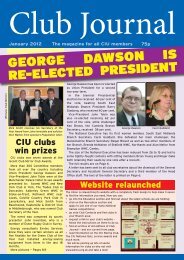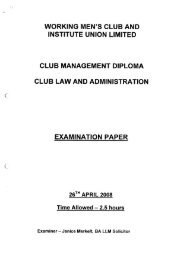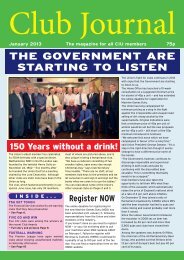Club
CJ November 2012.indd - CIU
CJ November 2012.indd - CIU
- No tags were found...
You also want an ePaper? Increase the reach of your titles
YUMPU automatically turns print PDFs into web optimized ePapers that Google loves.
Everything you need to<br />
know about PAT<br />
You MUST<br />
send in<br />
returns<br />
What is Portable Appliance Testing? Portable<br />
appliance testing (PAT) is the term used to<br />
describe the examination of electrical appliances<br />
and equipment to ensure they are safe to use.<br />
Most electrical safety defects can be found by<br />
visual examination but some types of defect can<br />
only be found by testing. It is essential, however,<br />
to understand that visual examination is an<br />
essential part of the process because some types<br />
of electrical safety defects can’t be detected by<br />
testing alone.<br />
I’ve been told that, by law, I must have my<br />
portable electrical appliances tested every year.<br />
Is that correct?<br />
A relatively brief user check, (based upon simple<br />
training and perhaps assisted by the use of a<br />
brief checklist), can be a very useful part of any<br />
electrical maintenance regime. More formal visual<br />
inspection and testing by a competent person<br />
may also be required at appropriate intervals,<br />
however, depending upon the type of equipment<br />
and the environment in which it is used.<br />
How frequently do I need to test my electrical<br />
appliances?<br />
The Electricity at Work Regulations 1989<br />
require that any electrical equipment that has<br />
the potential to cause injury is maintained in<br />
a safe condition. However, the Regulations<br />
do not specify what needs to be done, by<br />
whom or how frequently (i.e. they don’t make<br />
inspection or testing of electrical appliances a<br />
legal requirement, nor do they make it a legal<br />
requirement to undertake this annually). The<br />
frequency of inspection and testing depends<br />
upon the type of equipment and the environment<br />
it is used in. For example, a power tool used on<br />
a construction site should be examined more<br />
frequently than a lamp in a hotel bedroom. For<br />
guidance on suggested frequencies of inspection<br />
and testing, see the HSE publication “Maintaining<br />
portable and transportable electrical equipment”.<br />
Do I need to keep records of testing and should I<br />
label any appliances tested?<br />
There is no legal requirement to label equipment<br />
that has been inspected or tested, nor is there a<br />
requirement to keep records of these activities.<br />
However, a record and / or labelling can be a<br />
useful management tool for monitoring and<br />
reviewing the effectiveness of the maintenance<br />
scheme — and to demonstrate that a scheme<br />
150th Conference<br />
Next year’s CIU Conference, or Annual<br />
Meeting to give it its official title, will be<br />
held on Saturday, April 6. The Conference,<br />
which will be the Union’s 150th, will again<br />
be held at the Winter Gardens in Blackpool.<br />
exists.<br />
Do I need<br />
to test new<br />
equipment?<br />
New<br />
equipment<br />
should be<br />
supplied<br />
in a safe<br />
condition and<br />
not require<br />
a formal<br />
portable<br />
appliance<br />
inspection or<br />
test. However,<br />
a simple Burnley & Pendle Branch<br />
Secretary MICHAEL<br />
visual check is<br />
WOODVINE is a qualified<br />
recommended<br />
electrician and was in charge<br />
to verify the<br />
of maintenance for a major<br />
item is not vehicle parts manufacturer. He<br />
damaged. has compiled this questionand-answer<br />
guide to Portable<br />
I have been<br />
told that I Appliance Testing with the help<br />
have to get<br />
of information from the Health<br />
and Safety Executive (HSE)<br />
an electrician<br />
website.<br />
to do portable<br />
appliance<br />
testing work. Is that correct?<br />
The person doing testing work needs to<br />
be competent to do it. In many low-risk<br />
environments, a sensible (competent) member of<br />
staff can undertake visual inspections if they have<br />
enough knowledge and training. However, when<br />
undertaking combined inspection and testing,<br />
a greater level of knowledge and experience is<br />
needed, and the person will need:<br />
• the right equipment to do the tests<br />
• the ability to use this test equipment<br />
properly<br />
• the ability to properly understand the test<br />
results<br />
Is Portable Appliance Testing (PAT) compulsory?<br />
No. The law simply requires an employer<br />
to ensure that their electrical equipment is<br />
maintained in order to prevent danger. It does<br />
not say how this should be done or how often.<br />
Employers should take a risk-based approach,<br />
considering the type of equipment and what it is<br />
being used for. If it is used regularly and moved<br />
a lot e.g. a floor cleaner or a kettle, testing,<br />
(along with visual checks), can be an important<br />
part of an effective maintenance regime giving<br />
employers confidence that they are doing what is<br />
necessary to help them meet their legal duties.<br />
HSE provides guidance on how to maintain<br />
equipment including the use of PAT.<br />
If you need further information on the above<br />
subject, please contact your Branch Office.<br />
It is imperative for clubs to<br />
register Annual Returns each<br />
year with the Financial Services<br />
Authority.<br />
The FSA have advised that the<br />
submission of Annual Returns<br />
is a basic registration condition.<br />
Failure to submit Annual Returns<br />
will result in a substantial<br />
fine and/or cancellation of its<br />
registration. There can be no<br />
re-registration or re-instatement<br />
once a club has been deregistered.<br />
There are several implications in<br />
being struck off the FSA register.<br />
The club would lose its “limited<br />
liability status” exposing officers<br />
and members to personal<br />
financial risk. The club would<br />
lose its corporate status and<br />
become an unincorporated club.<br />
Without that corporate status,<br />
the club cannot sue or be sued<br />
in its own name — so any legal<br />
action against the club could be<br />
against a named officer.<br />
The FSA do write to every club<br />
each year. Not only is a blank<br />
Annual Return Form enclosed<br />
(with a freepost envelope) but<br />
clubs are advised at that time<br />
of the consequences of nonsubmission.<br />
Maureen Ross<br />
Head of Rules<br />
<strong>Club</strong><br />
Journal<br />
Official Journal<br />
of the CIU<br />
253-254 Upper Street,<br />
LONDON N1 1RY.<br />
Telephone: 020 7226 0221<br />
Fax: 020 7354 1847<br />
Email: info@wmciu.org<br />
Website: www.wmciu.org.uk<br />
Personal subscriptions:<br />
£7.50 per year<br />
Editor:<br />
Ken Roberts<br />
Editorial Office:<br />
Powdene Publicity, Unit 17,<br />
St Peter’s Wharf,<br />
NEWCASTLE NE6 1TZ.<br />
Telephone: 0191 265 0040<br />
Fax: 0191 275 2609<br />
News:<br />
Chris Brewis<br />
Email: cj@powdene.com<br />
Advertising:<br />
Mike Lyon<br />
Email: info@powdene.com<br />
Tel: 0191 488 7142<br />
<strong>Club</strong> Journal November 2012 7<br />
CJ November 2012.indd 7 24/10/2012 12:43











